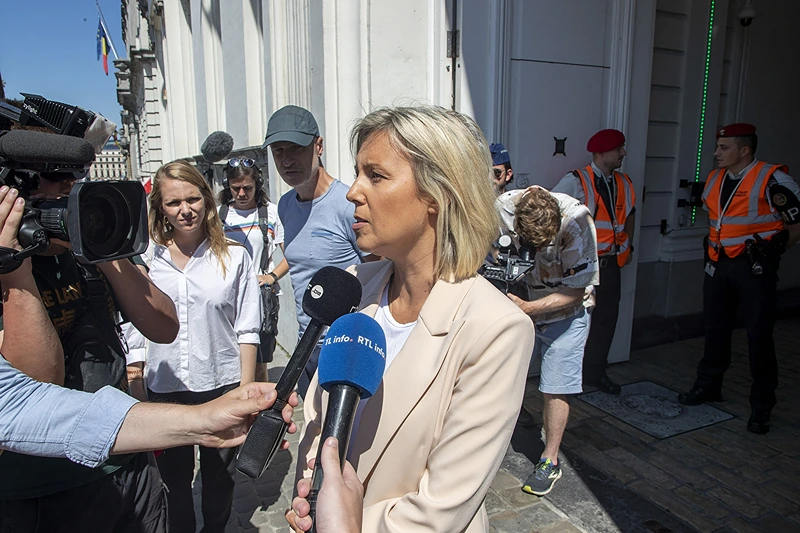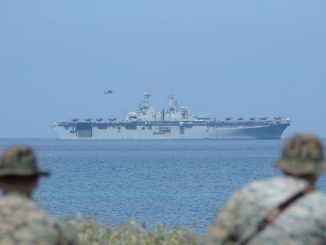

OAN’s Brooke Mallory
12:07 PM – Sunday, June 25, 2023
Following a short-lived uprising by mercenary forces that reportedly raised concerns for citizens regarding Putin’s capability to lead in the Ukraine war, Russian government troops retreated from the streets of Moscow on Sunday, while citizens gathered in parks and cafés.
Advertisement
The march on the capital by Wagner forces commanded by Yevgeny Prigozhin, as well as the late-night bargain that ultimately brought it to a halt, purportedly weakened Putin’s reputation as a leader eager to mercilessly punish anybody who threatens his authority.
According to the terms of the deal, Prigozhin will go into exile in Belarus but will not face prosecution, and neither will his soldiers. Since the agreement was revealed on Saturday night by Belarussian President Alexander Lukashenko, neither Putin nor Prigozhin have been heard from.
U.S. Secretary of State Antony Blinken (D-N.Y.) called the weekend’s developments “extraordinary,” referring to how Putin seemed set to conquer Ukraine’s capital 16 months ago, but now he must defend Moscow from forces commanded by his former protege.
“I think we’ve seen more cracks emerge in the Russian façade,” Blinken said on NBC’s Meet the Press. “It is too soon to tell exactly where they go and when they get there, but certainly we have all sorts of new questions that Putin is going to have to address in the weeks and months ahead.”
It was unclear what the 24-hour rebellion would signify for the war. However, it did result in the withdrawal of some of Russia’s strongest forces fighting in Ukraine, like Prigozhin’s own Wagner troops and Chechen men who were ordered to stop them.
“These events will have been of great comfort to the Ukrainian government and the military,” said Ben Barry, senior fellow for land warfare at the International Institute for Strategic Studies.
Another unknown factor is what will become of the Prigozhin-owned Wagner in general. The military contractor has troops stationed in a number of different countries, where they are thought to be fighting for Russian interests.
According to the terms of the deal that halted Prigozhin’s progress, Wagner troops who did not support the rebellion would be granted direct contracts with the Russian military, putting them under the jurisdiction of the military leadership that Prigozhin was attempting to depose.
Phillips O’Brien, a professor of strategic studies at St. Andrews University in Scotland, said that the pact looks to be a rushed arrangement aimed to preserve Prigozhin and safeguard his money and family.
“What we don’t know is if he saved Wagner,” O’Brien wrote in a newsletter. “It’s not clear how many of his mercenaries are coming with him to Belarus or how many will be forced to now sign contracts with the Russian military.”
Prigozhin’s soldiers gained control of two military bases in southern Russia on Saturday and advanced to within 120 miles of Moscow before returning.
In a scenario that plays into Putin’s fear of public revolts, press photographers and film crews captured pictures and video of crowds cheering on Wagner troops as they left Rostov-on-Don on Saturday. Some even rushed to shake Prigozhin’s hand as he drove away in the backseat of an SUV.
Later, the regional governor stated that all troops had departed the city. According to Russian news outlets, Lipetsk officials verified that Wagner soldiers had departed the territory, which is on the path to Moscow from Rostov.
On Sunday morning, Rostov seemed calm, with tank tracks on the roadways being the only sign and reminder of the Wagner soldiers.
“It all ended perfectly well, thank God. With minimal casualties, I think. Good job,” said a local resident who agreed to only provide his first name, Sergei. He continued, maintaining that the Wagner soldiers used to be heroes to him, but not anymore. “It shouldn’t have happened, but how it ended—thanks for that.”
Residents in the Lipetsk area seemed unmoved by the upheaval.
“They did not disrupt anything. They stood calmly on the pavement and did not approach or talk to anyone,” Milena Gorbunova told the press.
The roadways had been dug up to hinder the march, but they were refilled and smoothed over by Sunday.
Russian troops armed with machine guns set up checkpoints on the outskirts of Moscow while Wagner forces advanced north toward Moscow. Approximately 3,000 Chechen soldiers were rescued from battle in Ukraine and flown to Chechnya early Saturday, according to Chechen media sources.
By Sunday afternoon, the army had left the city, and residents rushed to the streets and cafés. Although traffic was restored and barriers and inspections were removed, Red Square remained inaccessible to tourists. Crews rebuilt motorways heading to Moscow that had been torn up in a hurry hours before.
The Defense Ministry’s Putin-supported demand, that private enterprises sign contracts with it by July 1st, was one plausible motive for Prigozhin’s rebellion. Prigozhin had refused to do so.
Stay informed! Receive breaking news blasts directly to your inbox for free. Subscribe here. https://www.oann.com/alerts





Be the first to comment